Eighty years ago today, on Monday 10 June 1940, Benito Mussolini declared war on Britain and France, as Italy gave its allegiance to Nazi Germany. Overnight, all 20,000 Italians resident in the United Kingdom saw themselves classified as enemy aliens and, of those, men who had lived in Britain for less than 20 years, and who were between the ages of 16 and 70, were considered for internment. Many of those resident in London and the south east were interned immediately, as invasion fears heightened, and as British troops retreated home from Dunkirk and the fall of France was imminent.
The fear of fifth columnists working for the enemies led Churchill to coin the phrase ‘Collar the Lot!’ This was a very different approach taken from that just nine months earlier, when internment tribunal boards carefully considered the fate of more than 73,000 resident Germans and Austrians living in the UK, and based on the information before them.
By 28 September, the Aliens Department of the Home Office had set up internment tribunals throughout the country, headed by government officials and local representatives, to examine every UK-registered enemy alien over the age of 16. The objective was to divide the aliens into three categories:
- Category A, to be interned;
- Category B, to be exempt from internment but subject to the restrictions decreed by the Special Order;
- and Category C, to be exempt from both internment and restrictions.
Some 120 tribunals were established, assigned to different regions of the UK. Many were established in London, where large numbers of Germans and Austrians resided. There were 11 set up in north-west London alone. The police were responsible for providing the details of enemy aliens to the tribunals as they kept registers of aliens, a requirement of the 1914 Aliens Registration Act (4 & 5 Geo. V c.12).
The vast majority (some 66,000) of enemy aliens were classed as Category C. Most, but by no means all, of the 55,000 Jewish refugees who had come to the UK to escape Nazi persecution in the early and mid-1930s, found themselves in Category C. Some 6,700 were classified as Category B and 569 as Category A. Those classified in Category A were interned in camps being set up across the UK – the largest settlement of which was on the Isle of Man, though others were set up in and around Glasgow, Liverpool, Manchester, Bury, Huyton, Sutton Coldfield, London, Kempton Park, Lingfield, Seaton and Paignton.
In the absence of tribunal boards, more than 4,000 Italian subjects, mainly men, were arrested on or just after 10 June 1940, including 31-year-old Carmine Forte. Born in Casalattico, in the Italian region of Lazio, and by trade a caterer, in 1940 Forte was a director of Strand Milk Bars Ltd, based in London. As with so many of his countrymen, Forte was interned on the Isle of Man. He remained there until his release in November 1940, when he became an adviser to the Ministry of Food.
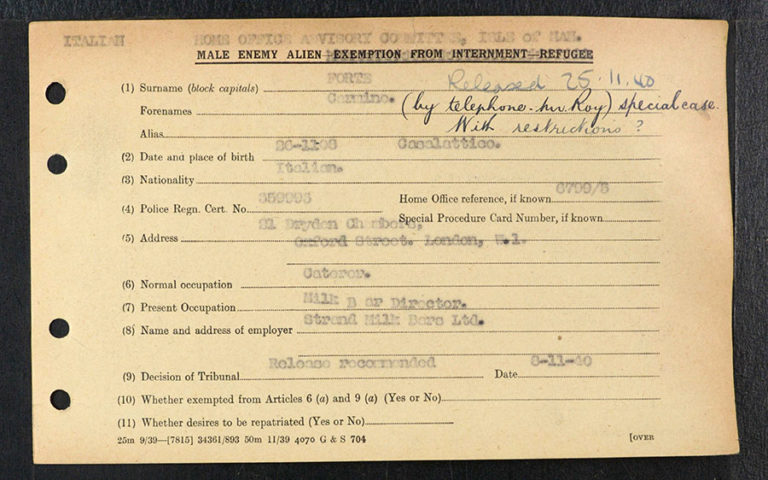
Forte had been in the process of applying to become British but his application was delayed because of the outbreak of war and, as such, he wasn’t naturalised as a British citizen until after the war ended in September 1946.
![Naturalisation Certificate: Carmine Forte. From Italy. Resident in London. Wife's name Irene Mary [Forte].](https://cdn.nationalarchives.gov.uk/blog/wp-content/uploads/2020/06/09124442/HO-334_164_19283-Carmine-Forte-Nats-768x1152.jpg)
Also known as Charles, Forte went on to become one of Britain’s most successful hoteliers, creating the Trust Houses Group Ltd and Forte Holdings, which would at one time include the Happy Eater and Little Chef roadhouse restaurants, as well as the hotel chains Crest, Forte Grand, Travelodge and Posthouse. Forte was knighted in 1970 and created a life peer in 1982. He died in London in 2007 at the age of 98.
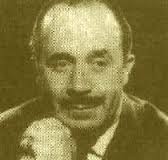
In 1940, 26-year-old Frank Berni was no longer an Italian national, having successfully taken out British citizenship six years earlier in 1934. However, following Italy’s declaration of war, regardless of their nationality those of Italian descent who were known to be members of the Italian Fascist Party were also ordered to be interned. As such, Berni, born in Bardi in the Italian province of Parma, but who had moved to Ebbw Vale in Wales with his parents at the age of 16 in 1919, was arrested on 10 June 1940 under the Emergency Powers (Defence) Act for being a person of ‘hostile associations’. He was detained in Liverpool prison and later spent some time at the internment camp in nearby Huyton, and in HM Prison Bristol. At the time of his arrest he was a successful businessman, owning cafes in Exeter, Plymouth and Bristol.
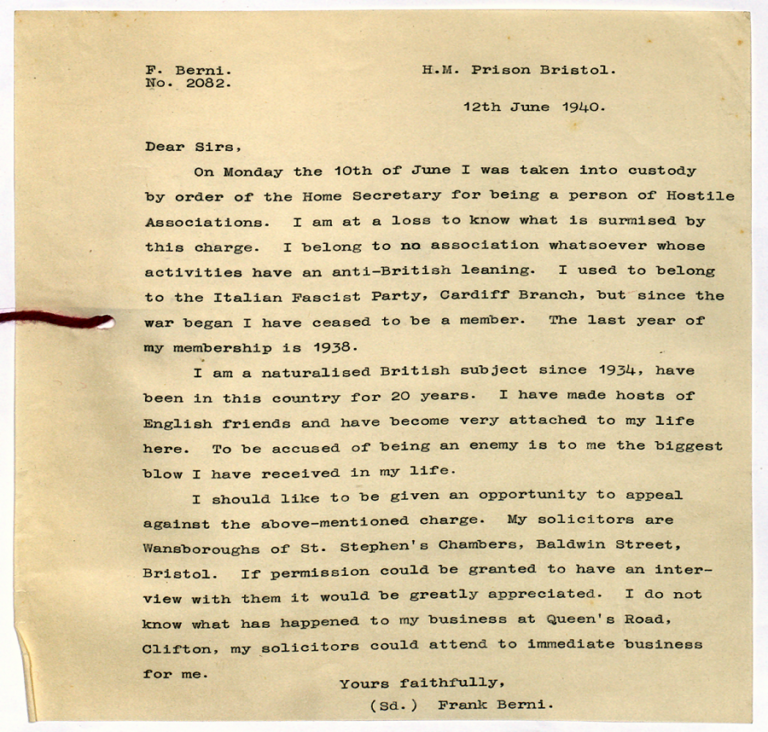
On 10 December 1940, Berni appeared before the Advisory Committee (Italian) to consider appeals against orders of internment. The document HO 405/2103 provides a detailed and fascinating account of that appeal. Berni explained that he had become a member of the Italian Fascist Party in 1923 because some of his friends had done so, and because it enabled him to attend annual dances at the Park Hotel and the Royal Hotel in Cardiff. He also claimed he had never attended meetings of the Fascio and did not know where their headquarters were in Cardiff, adding that he had never worn the Fascist badge in this country but he did so when he returned to Italy in the 1920s and 1930s.
In a visit to Italy in 1933, he was appalled at the brutal methods employed by the Fascists, and on his return applied successfully for naturalisation. He was granted a British passport in 1935. He also denied ever being a member of the Committee of the Cardiff Fascio, and added that he had endeavoured at the beginning of the war to join the Special Constabulary, and later to join the Air Raid Precautions (ARP) service in Cardiff. He also had no objection to fighting against all the king’s enemies, including Italians.
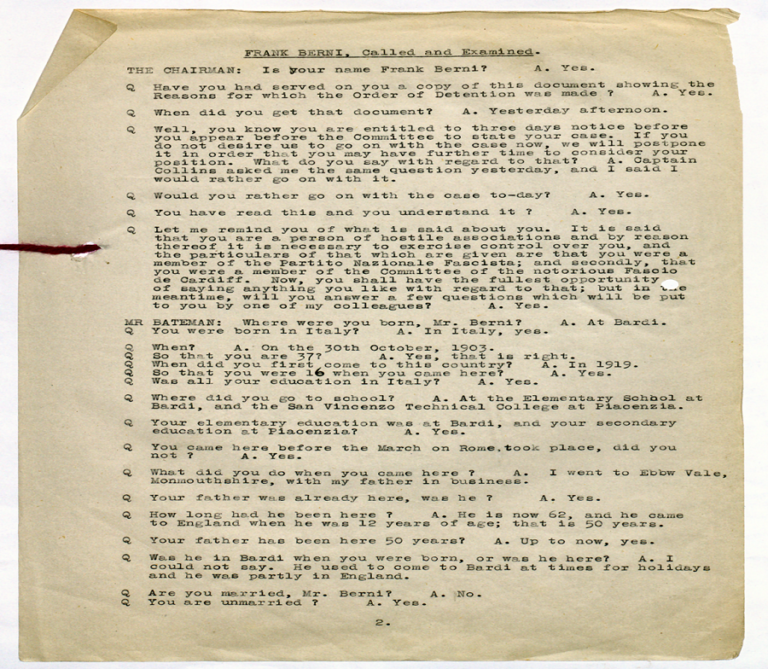
The file includes letters in support of his appeal from his auditor and also from the Ebbw Vale Justice of the Peace.
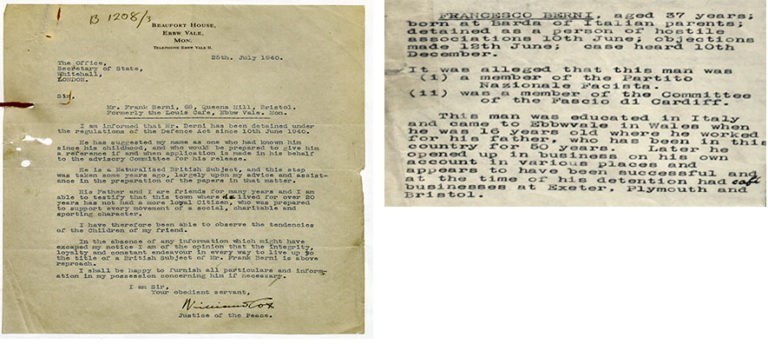
His case was heard on 10 December 1940, six months after his arrest. The Committee considered that Berni was rooted to this country, that any sympathy he had for Italy had for some time been moribund, and that his connection with the Fascist Party was little more than superficial. The Committee recommended his release from detention. Berni went on with his brother Aldo to establish the first Berni Inn steakhouse in 1955, remaining in England until his death in 2000 at the age of 96.
For many Italian citizens resident in Britain, their experiences were worse than those faced by Forte and Berni. With concerns over space to accommodate the growing number of internees, coupled with the suspicion that many of them were enemy agents, potentially helping to plan the invasion of Britain, a decision was taken to deport them overseas and many were transported to the Dominions of Australia and Canada, including 2,500 internees who embarked on a journey to Australia on 10 July 1940 on the vessel HMT Dunera.
The group comprised a mixture of Jewish refugees, Nazi sympathisers and some 200 Italians. The Jewish refugees and Nazi sympathisers were classified simply as Germans, and this caused resentment and conflict on the journey. The ship had a maximum capacity of 1,500 – including crew – and the resultant conditions have been described as ‘inhumane’. The deportees were also subjected to ill-treatment and theft by the 309 poorly trained British guards on board.
The 57-day voyage was also made under the risk of enemy attack. On arrival in Sydney, the first Australian on board was medical army officer Alan Frost. He was appalled and his subsequent report led to the court martial of the army officer-in-charge, Lieutenant-Colonel William Scott.
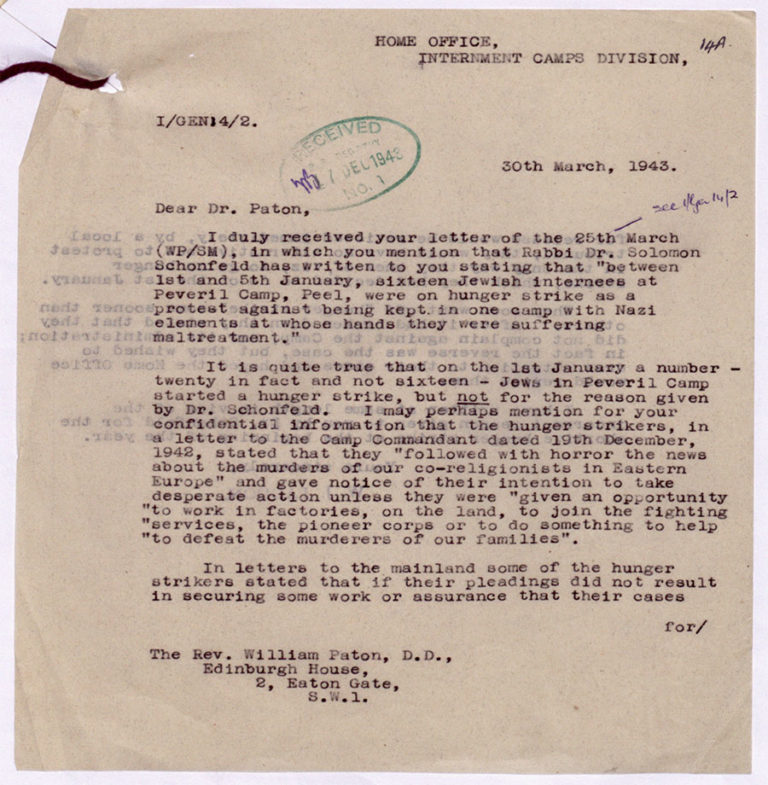
Tragically, on 2 July 1940, another ship deporting internees overseas, the SS Arandora Star, was torpedoed and sunk in the Atlantic en route to Canada. On board were 734 Italians, 438 Germans (including both Nazi sympathisers and Jewish refugees), and 374 British seamen and soldiers. Over half lost their lives, including 470 Italians.
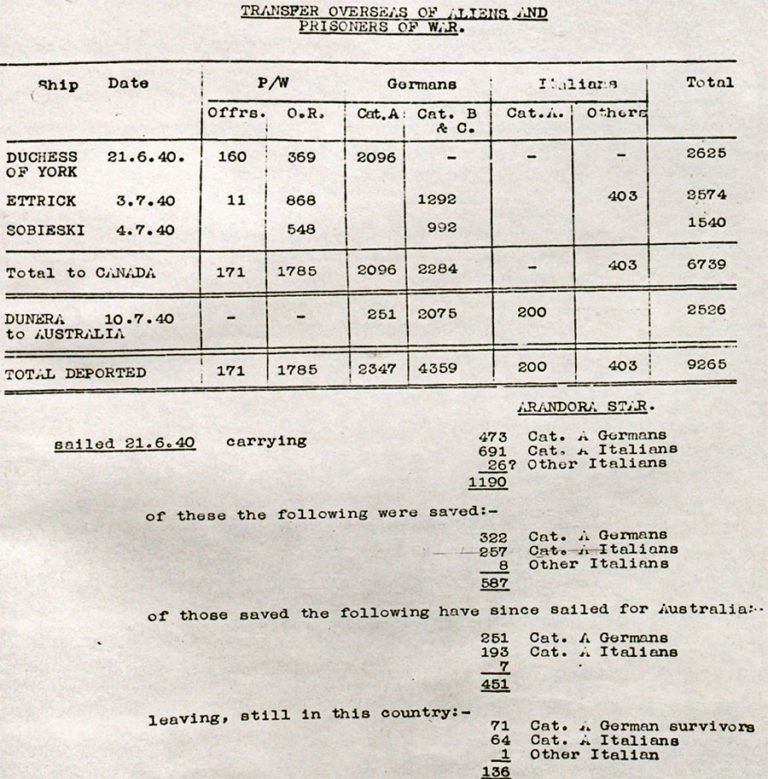
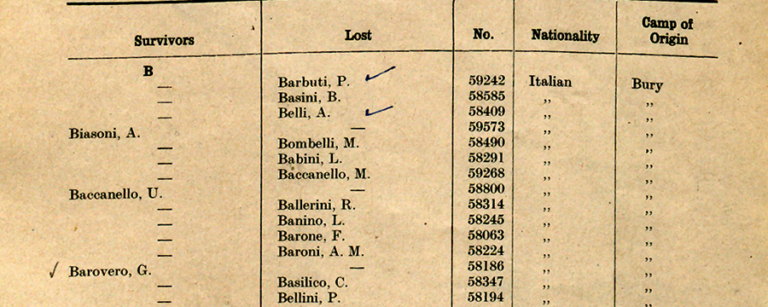
It was this event that swayed public sympathy towards the enemy aliens. The release of 1,687 enemy aliens was authorised in August 1940 and by October about 5,000 Germans, Austrians and Italians had been released following the publication of the Under-Secretary of the Home Office, Osbert Peake’s White Paper, Civilian Internees of Enemy Nationality. The Paper identified categories of persons who could be eligible for release.
By December, 8,000 internees had been released, leaving some 19,000 still interned in camps in Britain, Canada and Australia. Of the released, some 1,273 were men who applied to join the Pioneer Corps. They would be joined by internees in Canada and Australia but here the process of release would take longer. By March 1941, 12,500 internees had been released, rising to over 17,500 in August, and by 1942 fewer than 5,000 remained interned, mainly on the Isle of Man.
On the Record: 20th Century Migration (podcast)
There are over 900 years of immigration records available for research here at The National Archives. In a three-part podcast series we explore stories of migration in the 20th century.
In this series you’ll hear about major Acts that highlight shifts in policy around migration and citizenship over the past 100 years. We feature the profound and lasting impact of migration for citizens and non-citizens alike throughout Britain, its Empire, and the Commonwealth.
Subscribe: iTunes | Spotify | RadioPublic | Google Podcasts
PLEASE NOTE: Due to the age of this blog, no new comments will be published on it. To ask questions relating to family history or historical research, please use our live chat or online form. We hope you might also find our research guides helpful.
Scotland had a lot of Italians residing there and had done for decades and amongst there were the Nardini family, famous for their ice-cream and ice-cream parlour in Largs, Ayrshire. It could be argued that detainees were far safer than the British population who had to endure the bombing of the Nazis.
My mother, now deceased, told me there was an Italian prison of war camp on the Playing Fields of Enfield, running along the western side of the Great Cambridge Road. Mum said that you could invite prisoners to come for tea ! The prisoners could walk to the houses of their hosts. So they weren’t locked up. I suppose it was felt that they couldn’t get far if they ran away. I don’t know.
I understand there were several Italians in the Falkland Islands during World War 2 and that they may have been prisoners – might they have been internees in fact? I also believe that several of them were stonemasons and left their legacy in several buildings in Stanley. Do you have any records that indicate whether internees were sent to the Falkland Islands (and other overseas territories) or if they might have become internees whilst resident here based simply on nationality and instructions from the UK Government?
I am surprised to find that German Jewish refugees who were presumably fleeing persecution and risk of death were interred in the UK, as well as being deported to the colonies with nazi sympathisers.Then being torpedoed.One can imagine the atmosphere aboard the ships.Is anything more known about the detainees Italian or otherwise other than Charles Forte and Frank Berni.I suspect this would make an interesting subject for a TV documentary,unless of course one has already been produced.
I am aware that there were Italian POW’s in the Reading area and working on the local farms. I also know that several stayed on after then war and married English ladies in the area.
Looking to find account of name Casde believe to be of Italian decent. Believed to be a trolley bus driver in Harlesden London 1940 or there about or any family
There does not seem to be much mention of the Italian women who were interned. My mother Ida Narduzzo was one of six women interned on the first day, 10th June, and after one night in Cardiff prison, was taken to Holloway prison in London to experience the blitz there. There she met Kina Berni, Frank Berni’s sister, amongst others and they became life-long friends. She was later moved to the Isle ofMan and spent 18 months interned all together, being released as she was to marry my father, a British citizen. Her father spent over five years interned on the Isle of Man.
Liana Di Bon, nee Casale.
Hi, Do you refer to the Narduzzo families involved in mosaic and terrazzo trade? I have some information on the Narduzzos from the Friuli region (town of Fanna). I have published some articles on this migration experience.
My great grandfather was born in Lazio and moved with his parents to the UK with his brother. He was interned on the Isle of Man for over five years and died the following year. Does anyone know the treatment of POW on the Isle of Man? I was always told we don’t have our Italian surname as he was a fascist and now I’ve finally looked into this, maybe this ice cream vendor wasn’t a bad egg after all!
Any information on Alberto canigianni interned on Isle of Man with guido fabenni
My Grandfather Carmine Boccia had to report weekly to the police station.
He had an ice cream stall in Chapel Street Market Islington.
Is there a register of reportees?
My great grandfather, Francesco Rizza, was Scotlands first detainee under 18b. He was Scottish born of Italian stock but this regulation was used by a corrupt chief constable who had personal issues with Francesco. The Chief Constable was sacked following an investigation but this does not negate what my great grandfather endured. He also lost a cousin onboard the Arandora Star. An affidavit from Frank was published by Guy Aldred for The Word.
I only came to this website after reading “The Good Life Undone” by Adriana Trigiani. The sinking of the Andorra Star is part of the story. I had no knowledge of the Italian internees in the UK during WWII.
PS I’m 2nd gen in US by way of Villavallelonga, Sora and Pescina
My father was a seaman on the Arandora Star.
He was picked up in the North Atlantic Ocean without a life jacket’.
He had been in bed at the time of the attack.
The prisoners/detainees were under the command of the Military Police. Who took command of the evacuation.
The sailors were not able to take command and were not able to take control of the evacuation.
The MP’s just opened the doors and let the prisoners go. They had lifejackets but did not know how to use them, and many jumped overboard and broke their necks, and many jumped into the lifeboats from the ship and sunk them.
My father gave his lifejackets to his old friend who couldn’t swim and was not going to jump. He was very bitter at the MP’s who seemed to take over the lifeboats and saved themselves.
There as a film by the Italian survivors that lumped the sailors altogether and said the captain saved himself. That was not true the Captain went down with the ship.
My father and the other survivors who were left in the water were calling out to one another and were eventually picked up and taken to the port at Glasgow.
I’m looking for an English born man of Italian parents- Giovanni Mattiucci- born 1906 Brentford, later known as John Matthews. Have all the records up until 1939. We are wondering if he was interned in a camp during WW2, his family were confectioners and ice cream merchants. Was there a camp
In the Nottingham area?
My father Francis DiCerbo was interned along with his father Antonio to IOM due to being classed as aliens.. My father was 6 months old when arrived in Scotland from Italy. I would agree with many comments regarding the treatment of these men as my uncle was a rear gunner RAF on Lancaster bombers and was only member of crew killed in action.
Can anyone provide any information regarding IOM Italians from Scotland (Moffat Area)
My Great Grandfather- Silvio Bonci was born in 1883 in Luca Italy. He came to England in 1901 and was interned on the Isle of Man in 1941.
His wife, who was Irish was left at home with their 6 children.
He was a mosaic and ornament worker
Would like to have any information about Italian POWs on the Isle of Sheppey.
Reply to Robert Rudge
My father was shipped out on the Ettrick and interned in camp S/43 St Helens’s island, Montreal for 3.5 + years. His father and brother survived the Arandora Star and were sent to Australia on the Dunera. I have hundreds of letters he wrote from Canada and am in touch with other children of internees. Also with a Canadian researcher who has written a thesis on the camp in Montreal
My Great grandfather Angelo Vanni born in Cardoso, Tuscany. Came to Scotland Troon Ayrshire. Our cafe in Mauchline (Castle Cafe) is still in the family to this day. 94 years since opening 1930’s.
My Great grandfather was intered for 3 years on the isle of man.
I believe there was a low-level PoW camp, or possibly an internment camp, outside the village of Denford in Northamptonshire. I believe some of the men worked on the land locally, and elderly local residents remember them. Does anyone have any information on this camp?
I remember a camp of wooden huts and a water tower within a wire compound in Woodford Bridge Road, Ilford, East London, where we children used to talk to internees through the wire fence.
Does anyone know if this was for Italian internees, or German PoWs?
My father Giovanni Moruzzi and his brother Giuseppe ,were both on the Andora Star, my father Giovanni managed to survive in the Irish sea after nine hours or so .Unfortunately his brother died. After the survivors were picked up, later he was shipped out on the Dunera and sent to Australia, where he stayed until the end of the war.
PLEASE NOTE: Due to the age of this blog, no new comments will be published on it. To ask questions relating to family history or historical research, please use our live chat or online form. We hope you might also find our research guides helpful.